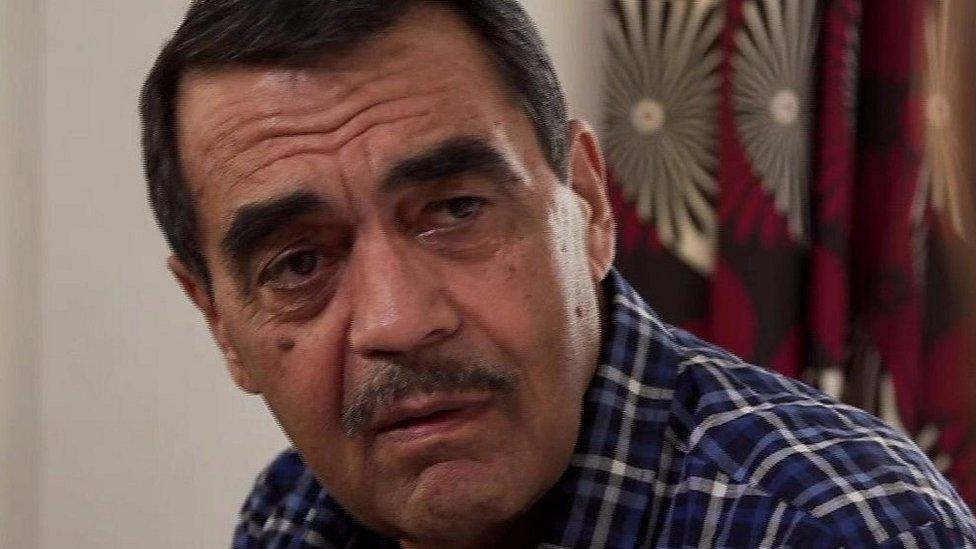The Grenfell survivor rebuilding his life, two weeks on
- Published
Olu feared he and his family would be killed in the fire
Two weeks ago, Olu was preparing to climb down from the 14th floor of Grenfell Tower on a makeshift rope of tied-together bed sheets, with his daughter on his back. Thankfully, he survived, after firefighters told him to run to safety - but what does his life hold now?
"My life wasn't perfect, but I was happy with it," Oluwaseun Talabi tells the BBC's Victoria Derbyshire programme, reflecting on times before the fire.
When Grenfell Tower set alight, in the early hours of Wednesday 14 June, Olu was in his flat, where he lived with his partner and four-year-old daughter.
He was awoken by screams of "fire! fire!" from his neighbours.
"We tried to run out of the house. But the first thing that hit us was this massive thick smoke, so we shut the door straight away," he says.
Olu began creating another escape route - tying bed sheets together in the hope of climbing down the outside of the building.
'My daughter's choking'
Desperate to save his four-year-old daughter, he then tied her - using cloths - to his back.
His intentions were broken only by the entrance of firefighters.
They had earlier moved five other residents into his room.
Now, they told Olu to run to safety.
"I grabbed my missus, and I just went for it," he says.
"When I got in that smoke, I thought I was going to die. I thought I wouldn't make it down those stairs.
"My daughter is choking, I'm choking, my partner is falling down the stairs - I'm trying to hold her hand," he says, recalling his frantic search for the exit.
"I do not know how we made it down there."
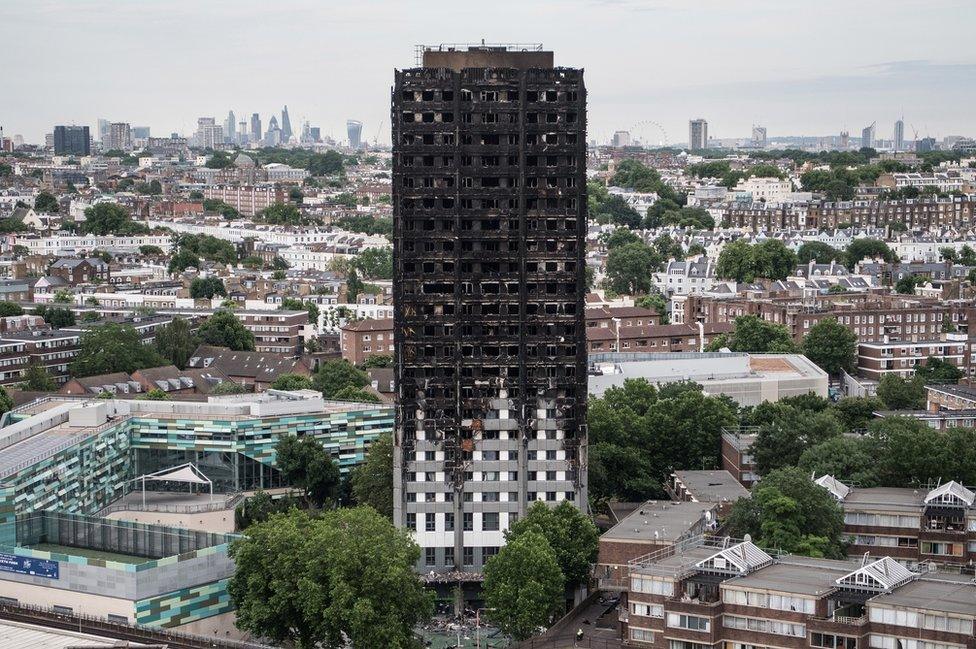
The charred remains of where Olu used to call home
Olu now feels very fortunate that he - and his family - survived.
He says he thinks of those that died every night.
Scared of the dark, he sleeps with the television on to light up the room.
He says it stops him from seeing those that died.
Asked if he has been offered mental health support, he responds: "I think I need help."
'Everyone loved him'
Several days after the fire, Olu - who is staying at a hotel with his family - is surprisingly keen to return to the west London tower block.
"I just want to see what I've come out from," he says.
As he walks through the streets in the surrounding area, he sees "missing" posters for his neighbours - many of whom he knew.
"I know Steve, he lived on the 15th floor - a very nice guy. We were always chatting and bumping into one another," he says, looking at one of the images plastered on the brickwork of a pillar of a nearby bridge.
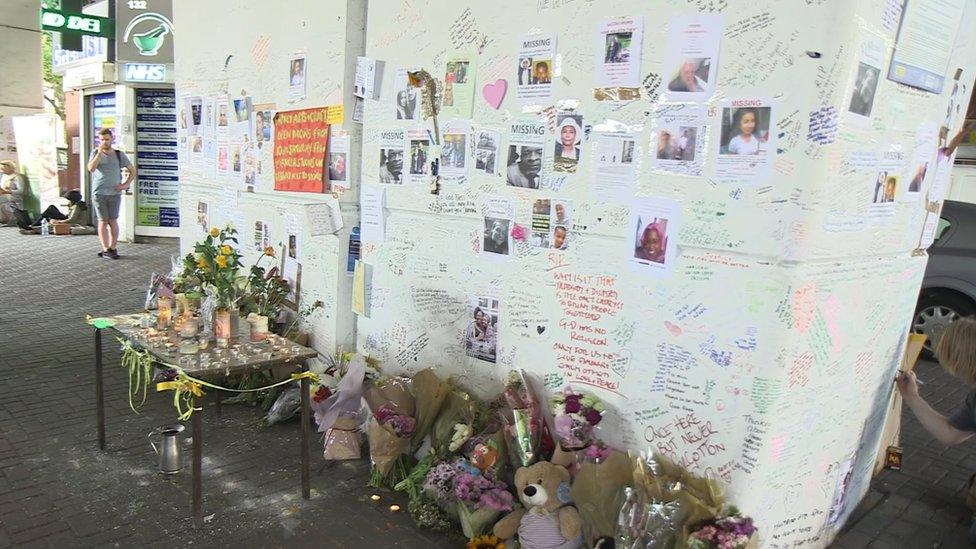
Posters and written tributes line a pillar near Grenfell Tower
"Everyone loved him, the whole community loved him," he says, speaking of another.
But it is a third image that affects him the most, taking him aback.
It is a photo of Zainab Deen - one of the residents firefighters placed in his flat - and her two-year-old son Jeremiah.
Olu battles to find the words.
"This little kid here," he says, pointing to Jeremiah - who has been missing since the fire - "now he's gone".
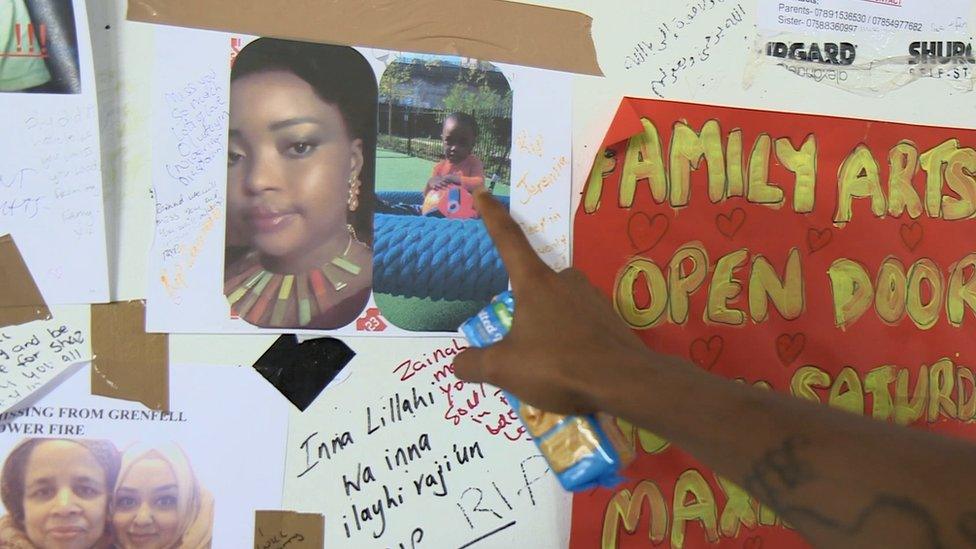
Zainab and her son Jeremiah are listed among the missing
Of the other three people placed in Olu's flat, Syrian refugee Mohammed Alhajali died after being separated from his brother Omar - who was also in the flat, and survived.
Denis Murphy, 56, is still missing. His family say they last heard from him in the early hours of Wednesday sometime between 01:30 and 02:00.
Soon after, Olu sees a poster of another resident, a woman named Debbie, who he did not know was missing.
"Wow, I feel funny, man. Wow," he says, raw with emotion, as he visibly struggles to digest the news.

Find out more
Watch the Victoria Derbyshire programme on weekdays between 09:00 and 11:00 on BBC Two and the BBC News channel.

After a few minutes, Olu says he is ready to continue the walk to Grenfell Tower.
As he turns the corner, he sees what is left of his home for the first time.
"I can smell it. It brings back the memories," he says.
"It looks like something out of Syria. I guarantee there's dead bodies in there right now."
For Olu, seeing the building is part of the healing process - to somehow make sense of what happened that night.
"I think it would actually make me happy if I could go in there - but I know it's not possible."
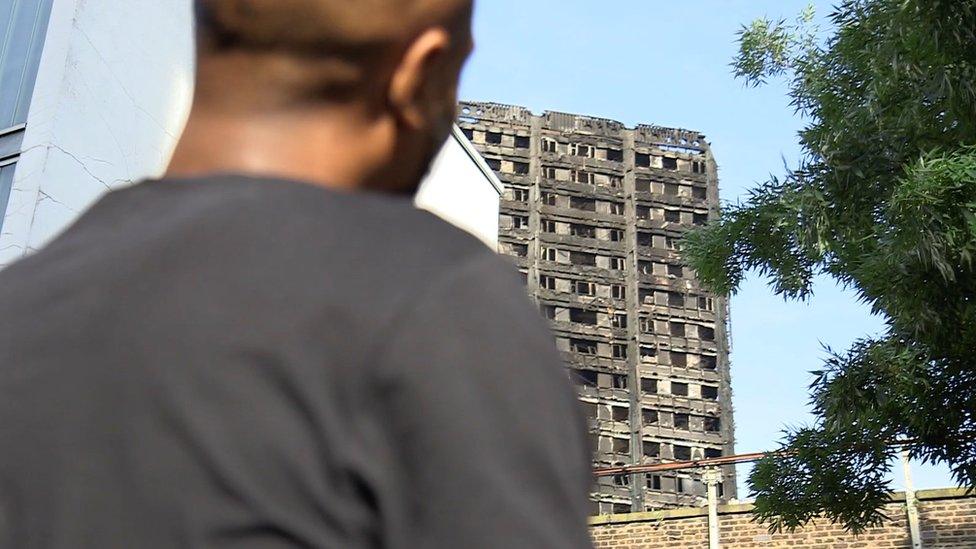
This is the first time Olu has been back to Grenfell Tower since the fire
Olu is now keen to start rebuilding his life.
He has been left with no possessions, and no home.
He is clearly exhausted, on occasion struggling to walk, but is visiting local centres that provide money, clothes, food and drink to survivors - using donations from the public.
Olu, however, is understandably keen to regain his independence - and provide for his family.
"I don't want to have to keep coming back here for money," he says, outside one of the centres.
"I'm happy that people are willing to help us, but I'm a hardworking guy.
"We don't want to feel like a charity case."
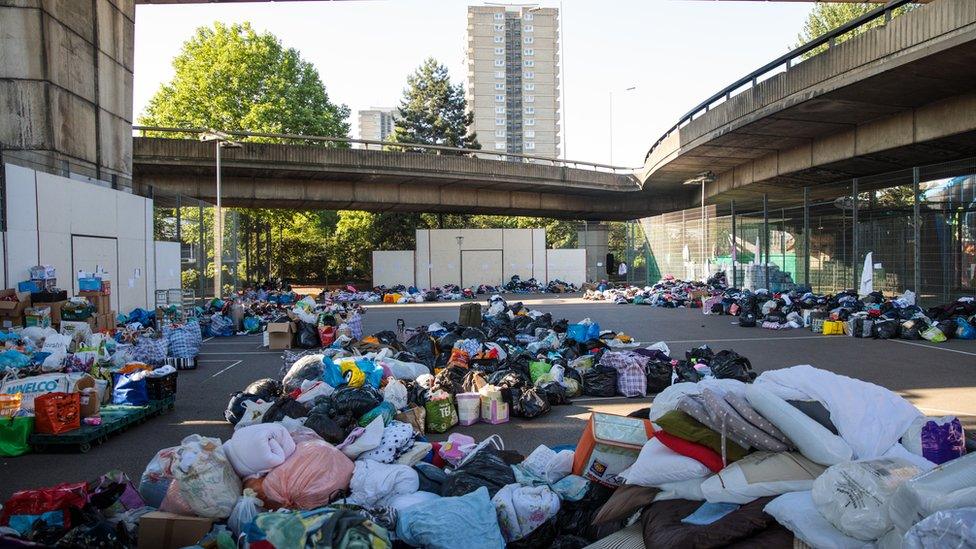
Large numbers of donations were left for the survivors of the Grenfell Tower fire
The most important thing for Olu now is to find a suitable new home.
He recently turned down an offer to be re-housed, because it was too far from his daughter's school.
He is trying to stay upbeat, however, and describes himself as a "naturally positive guy".
He hopes to go back to university to finish a master's degree in construction management.
But perhaps the more pressing concern is to find some time to escape recent events, to digest all that has happened.
"I think I need to get away from all of this. Maybe just a little holiday or something," he says.
- Published27 June 2017
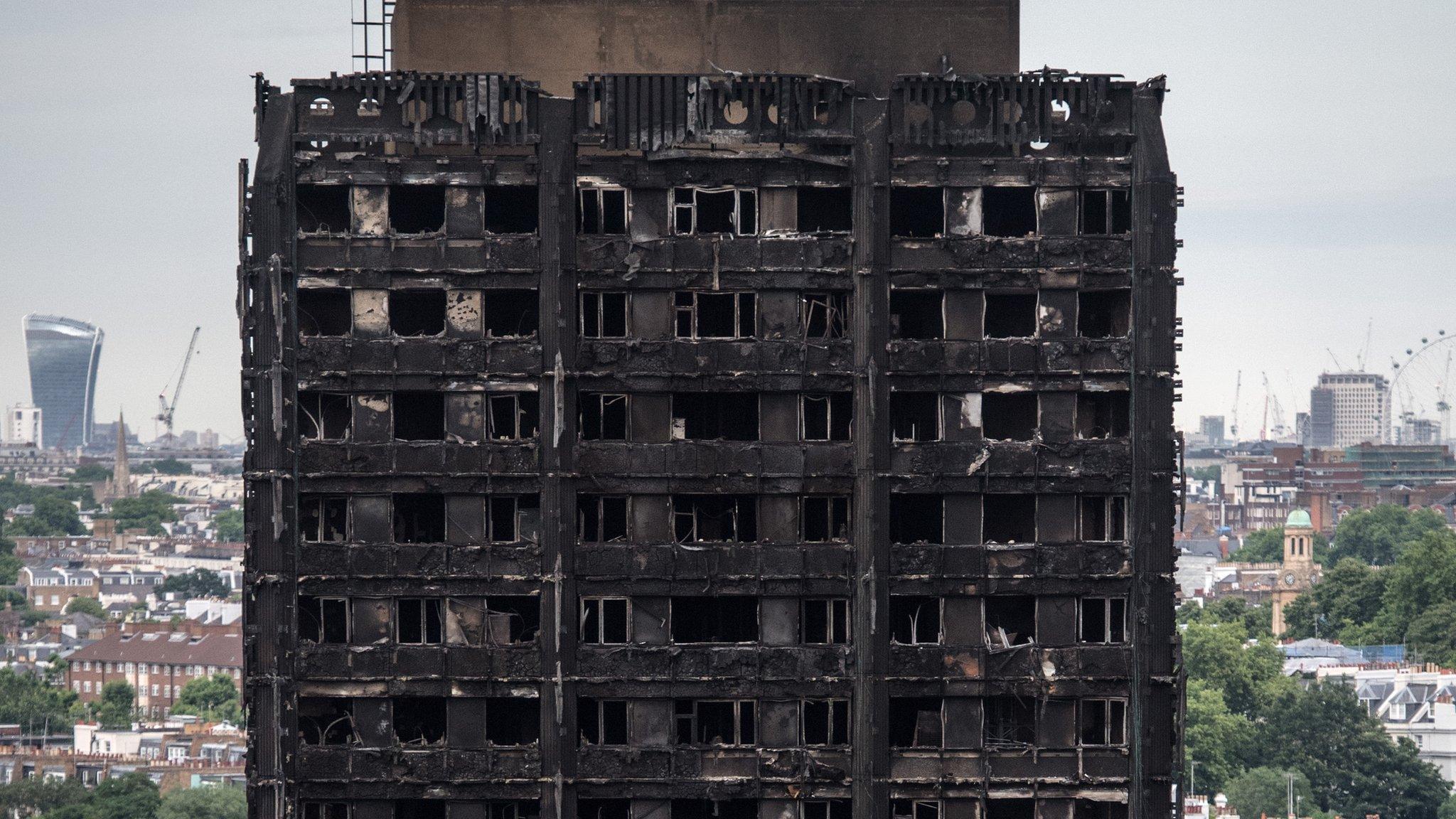
- Published26 June 2017
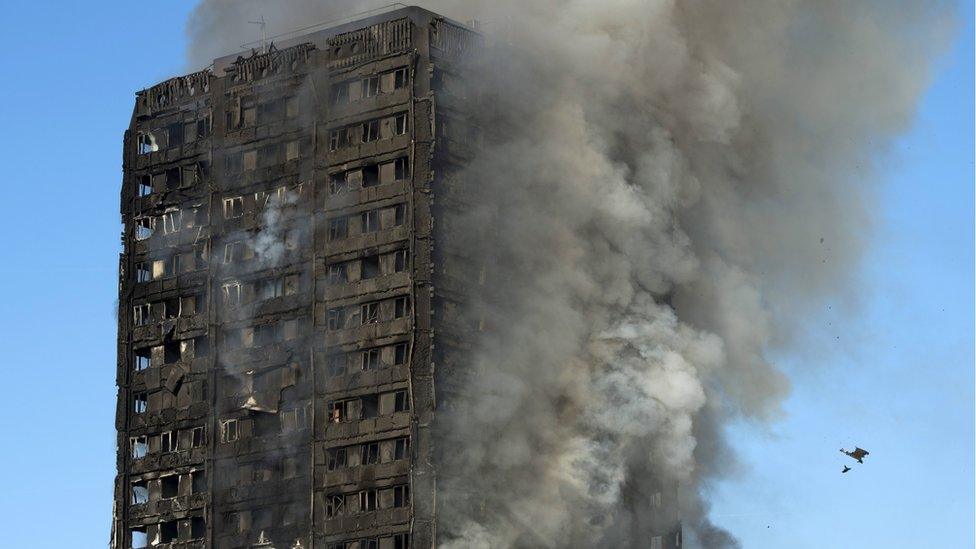
- Published27 June 2017
